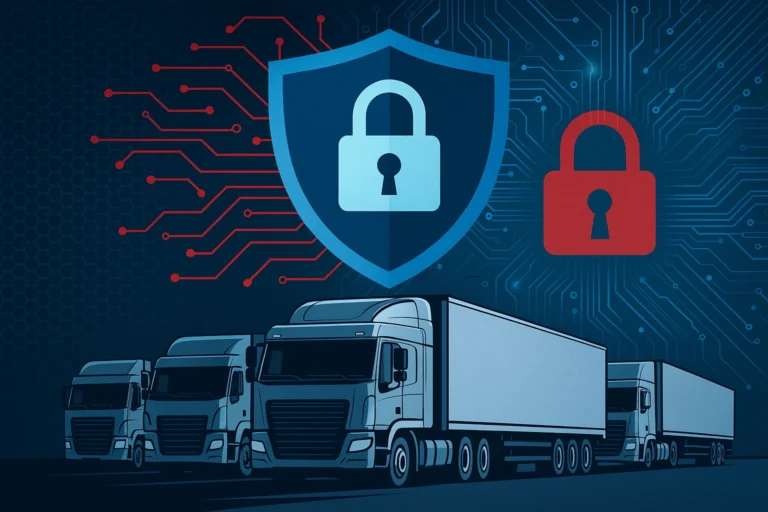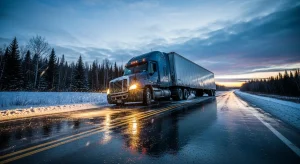The extended factory closure of Jaguar Land Rover after a cyberattack underscores how vulnerable transportation and logistics companies are when operations hinge on digital systems. For trucking fleets, the warning is clear: cybersecurity is now as critical as fuel and tires.
Jaguar Land Rover: A Costly Wake-Up Call
Britain’s largest automaker, Jaguar Land Rover (JLR), has been forced to extend the shutdown of its factories until October 1 after a cyberattack paralyzed operations earlier this month. The incident, which has sent shockwaves through the global auto industry, has revealed the staggering costs of digital vulnerability.
According to the BBC, the luxury carmaker — owned by India’s Tata Motors — is losing an estimated £50 million ($68 million) per week, with production of roughly 1,000 vehicles per day on hold. Most of its 33,000 employees have been sent home while systems remain offline.
For the trucking and freight sector, the parallels are alarming. If a cyberattack can cripple one of the world’s top automakers, fleets that increasingly depend on digital platforms are just as exposed.

Why Trucking Fleets Should Pay Attention
While JLR builds cars, the operational backbone of today’s trucking industry relies on the same kind of digital integration. Virtually every aspect of modern freight transport is now connected:
Telematics systems track vehicle performance, fuel efficiency, and driver behavior.
Electronic Logging Devices (ELDs) are mandatory in the U.S. to monitor hours of service.
Cloud-based Transportation Management Systems (TMS) assign loads, optimize routes, and sync with shippers.
IoT sensors in trailers and cabs measure everything from cargo temperature to tire pressure.
If any of these layers is breached, the disruption can rival the impact of a large-scale labor strike or a multi-vehicle crash on an interstate.
Concrete Risks for the Trucking Sector
The Jaguar Land Rover shutdown offers a blueprint of what could happen to fleets if cyber defenses fail. Key risks include:
Operational paralysis: Without access to TMS or load-assignment platforms, hundreds of trucks could sit idle at depots.
Data manipulation: Altered records on weight, delivery times, or routing could trigger contract breaches and penalties.
On-road threats: Cyber intrusions into electronic braking or engine control systems could directly endanger highway safety.
Financial fallout: As with JLR, standard insurance often excludes cyberattacks, leaving companies exposed to multimillion-dollar losses.
Not Just Theory: Real-World Incidents
The JLR case is only the latest headline in a growing list of cyber disruptions affecting transport. In 2023, a European logistics firm had its port operations paralyzed for weeks after a ransomware attack.
In the U.S., the American Trucking Associations (ATA) has warned that targeted cyberattacks on the freight sector represent one of the fastest-rising threats of 2025. Industry analysts note that such incidents don’t just threaten individual carriers — they can destabilize entire supply chains.
The Takeaway for Fleets
For trucking companies, the lesson is unmistakable: cybersecurity is no longer an IT issue, it is a core operational risk. As fleets modernize with smart trucks, connected trailers, and AI-driven platforms, their exposure grows.
Just as preventive maintenance keeps trucks safe on the road, proactive investment in cybersecurity — from firewalls and monitoring to staff training and incident response plans — is essential to keep fleets moving.
The Jaguar Land Rover shutdown is a high-profile reminder that in today’s transport world, a digital breakdown can be just as costly as a mechanical one.

Frozen Roads After Bomb Cyclone: Black Ice, Record Snow and High Risk for Trucks
Frozen roads continue to disrupt freight transportation following the impact of a powerful bomb cyclone, leaving behind black ice, highway shutdowns, power outages, and dangerous winter driving conditions stretching from the Gulf Coast to New England.

Lunar New Year 2026: Ancient Traditions, Renewed Energy, and Massive Celebrations
Lunar New Year 2026 begins on February 17 under the sign of the Fire Horse and is marked by spiritual rituals, family reunions, and large-scale celebrations in both China and the United States, especially in California.

Freedom 250 Grand Prix: How Logistics and Transportation Will Power the Race in Washington
The first-ever IndyCar street race in Washington, D.C., scheduled for August 21–23, will headline the United States’ 250th anniversary celebrations — and it will trigger a massive transportation, freight, and urban logistics operation behind the scenes.

Groundhog Day: What It Means for Trucking When “Phil Sees His Shadow”
The forecast from America’s most famous groundhog is calling for more winter — and that’s an important signal for the trucking industry and cold-season route planning

Love on the open road: the best dating apps for truckers
If you’re looking for someone to go the long haul with, here are the best dating apps for truck drivers. They say love is everywhere…

The most congested cities in the U.S. and the world in 2025
The annual TomTom Traffic Index produces a ranking of the most congested cities in the world. The annual TomTom Traffic Index presents an analysis of
